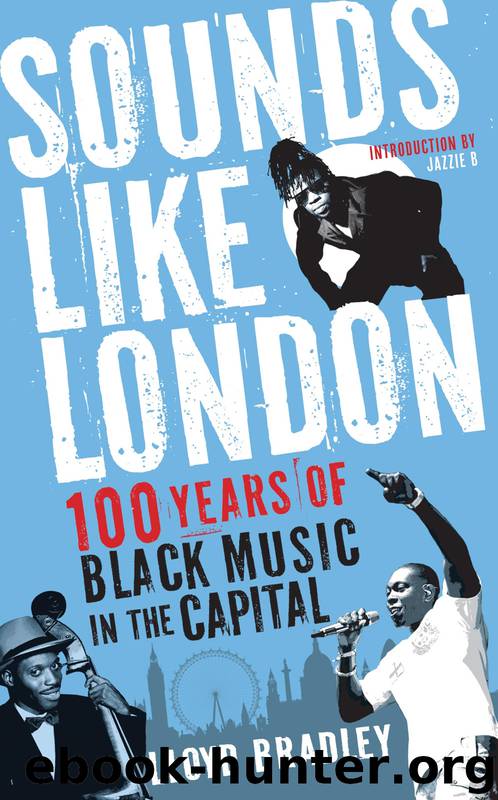Sounds Like London by Lloyd Bradley

Author:Lloyd Bradley
Language: eng
Format: epub, mobi
Publisher: Profile
Published: 2013-06-19T16:00:00+00:00
Lloydie Coxsone (right) and his fellow giant of London’s lovers’ rock sound systems, Fatman, get ready for a dance in the early 1980s.
Ska became enormously popular. The mods who came to the Soho clubs where Vego and other Jamaicans were deejaying also enabled it to make inroads into English youth culture. Emil Shallit’s Melodisc set up a ska-dedicated label, Bluebeat, licensing from Kingston and recording ska in London with Georgie Fame as a regular contributor. However, even though Millie’s exuberant “My Boy Lollipop” reached number two in 1964, and Prince Buster’s “Al Capone” went top twenty in 1967, ska never had a sustained impact on British music until Two Tone came along almost twenty years later. Much like calypso, it came and went leaving only a very shallow footprint.
GIVEN THE TIDAL WAVE of superb dance records that flowed out of Jamaica in the 1960s, and the growth of UK sound systems, the island’s music bossed things at street level. So much so, that by the end of the decade, rock steady and reggae had seeped into the working-class end of London youth culture, thanks to black and white kids who grew up together on inner-city estates. Trojan Records, launched in 1968, licensed on a large scale from Jamaica’s booming music business, and several London-based labels recorded reggae over here specifically for the domestic market.
Soon enough, the music was fulfilling its pop potential. In the ‘Trojan Explosion’, at the turn of the decade, Brit-friendly, ‘stringsed-up’ reggae – tracks imported from Jamaica, then remixed to add strings and other sweetening – gained mass acceptance. While reggae classicists often dismiss this jaunty, satin-suited reggae as pretty much worthless – pure pop’n’polyester – acts like Greyhound, Bob & Marcia and Nicky Thomas were in reality a deeply compelling expression of that particular time and place. With their flares, ‘fros and upbeat attitude, in the context of London circa 1970 they were hugely aspirational – remember, at this point in time, if you saw a black face on television you’d shout for the rest of your family to rush to the living room. Glamorous black pop, as valid and as valuable to a lot of youngsters as the Jackson 5 or Chairmen of the Board, this music deserves to be lauded for its success in tailoring a foreign sound to take its place in the wider world, and appeal to those who were brought up with British pop music playing in the background. It was really something of a triumph, albeit a short-lived one.
When the likes of Desmond Dekker, the Upsetters and the Pioneers were making it onto Top of the Pops, so too were the Temptations, the Supremes, Johnny Johnson and the Bandwagon, and Marvin Gaye. Then, once the 1970s rolled around, Shaft ushered in blaxploitation, James Brown’s Sex Machine kick-started a funk revolution, and imported TV shows, building on the success of I Spy and Julia, stopped ignoring African-American actors. When it came to images of cool black people – most of whom
Download
This site does not store any files on its server. We only index and link to content provided by other sites. Please contact the content providers to delete copyright contents if any and email us, we'll remove relevant links or contents immediately.
| Anthropology | Archaeology |
| Philosophy | Politics & Government |
| Social Sciences | Sociology |
| Women's Studies |
Cecilia; Or, Memoirs of an Heiress — Volume 1 by Fanny Burney(32558)
The Great Music City by Andrea Baker(32018)
Cecilia; Or, Memoirs of an Heiress — Volume 2 by Fanny Burney(31956)
Cecilia; Or, Memoirs of an Heiress — Volume 3 by Fanny Burney(31941)
We're Going to Need More Wine by Gabrielle Union(19046)
All the Missing Girls by Megan Miranda(16023)
Pimp by Iceberg Slim(14506)
For the Love of Europe by Rick Steves(14121)
Bombshells: Glamour Girls of a Lifetime by Sullivan Steve(14073)
Talking to Strangers by Malcolm Gladwell(13370)
Norse Mythology by Gaiman Neil(13363)
Fifty Shades Freed by E L James(13239)
Mindhunter: Inside the FBI's Elite Serial Crime Unit by John E. Douglas & Mark Olshaker(9339)
Crazy Rich Asians by Kevin Kwan(9290)
The Lost Art of Listening by Michael P. Nichols(7506)
Enlightenment Now: The Case for Reason, Science, Humanism, and Progress by Steven Pinker(7311)
The Four Agreements by Don Miguel Ruiz(6765)
Bad Blood by John Carreyrou(6621)
Weapons of Math Destruction by Cathy O'Neil(6279)
